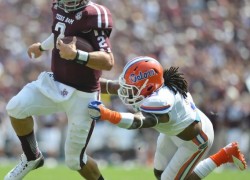
When No. 1 Notre Dame takes the field for the BCS National Championship Game in Miami on Jan. 7, a Southeastern Conference team will be on the opposite sideline.
However, the Fighting Irish should not be suiting up against Alabama or Georgia.
Florida should be playing Notre Dame for the crystal football.
Now before you go H.A.M. on my inbox and call me an idiot, just relax for a second.
I’m not saying the Gators are necessarily better than the Crimson Tide. And as far as the Bulldogs are concerned, well, y’all saw what happened in Jacksonville on Oct. 27.
But in this messed up, no-good joke of a postseason that the BCS forces upon college football every year, it’s all about the resume.
And Florida has one hell of a body of work.
The first item to consider is strength of schedule, and UF wins this three-way battle in a landslide that conjures up images of the vinegar-baking soda volcanoes we all used to make in elementary school.
The Gators have defeated four teams currently ranked among the top 15 in the BCS standings. Two of those victories were fourth-quarter comebacks on the road.
The first rally came against Texas A&M and Heisman frontrunner Johnny Manziel. The second was against Florida State, the likely Atlantic Coast Conference champions.
The other two wins were dominant performances against top-10 squads at Ben Hill Griffin Stadium. UF outmuscled and wore down LSU on the line of scrimmage. Two weeks later, the Gators punched Steve Spurrier and South Carolina in the mouth.
Meanwhile, Alabama and Georgia have a combined 2-2 record against the top 15 teams in the BCS.
Let’s branch out to the bigger picture by taking a look at the overall schedule for each team. Eight of Florida’s opponents this season are bowl eligible.
In all, the Gators’ 12 opponents are 92-50 this season, which averages out to 8-4.
Only five Georgia foes will be eligible to receive a bowl bid. That includes Georgia Tech, which will need to request a special exception once a likely defeat in the ACC Championship Game drops it to 6-7.
Alabama boasts a more respectable slate with six bowl-eligible opponents, but take into consideration that its opposite-division draws were Tennessee and Missouri.
Georgia nabbed Ole Miss and Auburn, and Florida got stuck with Texas A&M and LSU.
The average opponent the Crimson Tide and the Bulldogs faced this season was 6-6.
Regardless of schedule, each team took care of business like great teams do. But how did each squad fare in its one bad game?
In other words, who has the best loss?
Again, Florida wins with little contest.
The Crimson Tide fell flat on their trunks from the get-go and had no answer for Manziel and the Aggies, falling behind 20-0 in a 29-24 defeat on Nov. 10 at Bryant-Denny Stadium. Alabama let a freshman quarterback take over Tuscaloosa like it was nothing.
At least Georgia’s loss came on the road to a top-10 team, but the positivity ends there. The Gamecocks destroyed the Bulldogs, jumping out to a 21-0 lead in the first quarter and surrendering UGA’s lone touchdown with 1:55 left to play — garbage time.
UF’s loss — albeit to Georgia — was a one-score defeat at a neutral site. While the game was an anomaly for both teams, Florida was competitive from wire to wire.
The Gators clearly have a better claim than both the Bulldogs and the Crimson Tide to play for it all in Miami. The one obstacle in UF’s way is its failure to win the SEC.
But even with a win in the SEC title game, Alabama and Georgia still play second fiddle to Florida when it comes to the overall resume.
Conference championships simply do not matter in the big picture anymore.
Just ask the Crimson Tide, who won last year’s national title despite not playing in the SEC Championship Game. The Fighting Irish are the nation’s top-ranked team, and the school is an independent in football.
The BCS is egregious, offensive and unfair.
When UF is left on the outside looking in, it certainly won’t be the first deserving school shafted by the system. Auburn should have advanced ahead of Oklahoma in 2004, and Texas should have played Florida for the national title instead of Oklahoma in 2008.
Frankly, all three of the SEC’s one-loss teams should be part of an eight-team playoff to determine the national champion, but that would make sense and people would be happy.
The BCS doesn’t exist to produce an honest and deserving champion. It’s shortsighted.
Luckily, this whole sham will be revamped in 2014, and we won’t have to worry about which two teams are the most deserving. More contenders will earn a legitimate shot.
But as long as we’re forced to pick only two teams to play for the national title, it might as well be the squads that have performed the best against elite competition.
This year, those teams are Notre Dame and Florida.
